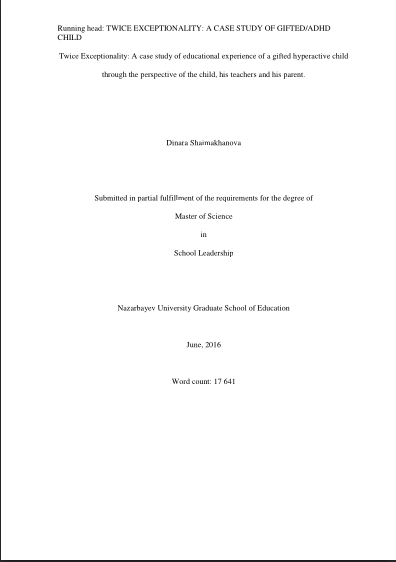The main focus of this study is to explore the phenomenon of twice exceptionality in one of Kazakhstani mainstream schools. One of the main educational strategies of the development of educational system in Kazakhstan till 2020 is connected with improving inclusive education in Kazakhstani mainstream schools. That is why the phenomenon of twice exceptionality is becoming a hot topic for both practitioners and researchers.
The purpose of the qualitative research is to explore the educational experience of a twice exceptional child identified as GADHD (gifted/ attention deficit hyperactivity disorder) studying in a mainstream school in Kazakhstan within the context of inclusive education.
The study is aimed to investigate the educational characteristics of a gifted hyperactive child through the perspectives of the child, his teachers and his parent. Firstly, the study analyzed teachers’ awareness of, attitudes about, and experience with twice exceptional children; and the ways how such children are usually identified. Secondly, the research investigated the effects of school and home environments on educational experience of a twice exceptional child followed by examining the inclusive education strategies to accommodate gifted hyperactive students’ needs.
This study was based on a case study method of qualitative research approach. The main participants of the study were a twice exceptional primary school child and his mother, as well as two of his current teachers and one possibly future teacher, who were both interviewed and observed during the study.
The results of the study showed that twice exceptionality is a problem in Kazakhstani schools. It was concluded that educational experience of twice exceptional children in Kazakhstan depends on several factors and there are no universal strategies to accommodate the unique needs of gifted hyperactive children.
